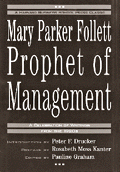"Mary Parker Follett: Prophet of Management" edited by Pauline Graham
Mary Parker Follett: Prophet of Management, edited by Pauline Graham (309 pages, Harvard Business School Press, 1994)
(originally published by Booz & Company) One of the striking things about the collection of lectures and commentary entitled Mary Parker Follett: Prophet of Management is how many of the contributors first encountered Miss Follett's work early in their graduate school careers, and quickly filed her away on a dusty, soon-to-be-forgotten shelf in their minds.
One of the striking things about the collection of lectures and commentary entitled Mary Parker Follett: Prophet of Management is how many of the contributors first encountered Miss Follett's work early in their graduate school careers, and quickly filed her away on a dusty, soon-to-be-forgotten shelf in their minds.
Although many contributors now pay homage, only the volume's editor, Pauline Graham, a nonacademic and a marketing and management consultant who came across Miss Follett's groundbreaking work on management relations during a browse at the Westminster Library in London, seems to have found a practical use for her. In the field itself, Miss Follett, as Peter F. Drucker writes, became a nonperson.
That is unfortunate because the work of Miss Follett, who emerged from the late-19th-century milieu of Boston and Cambridge and came eventually to have a career as a writer, lecturer and consultant, was eerily prescient. The lectures in this book, on "the circular response" and "constructive conflict," among others, might have popped off the page of any number of recent volumes on empowerment and "new" cooperative forms of work relations. The immensely popular books Getting to Yes and The Wisdom of Teams particularly come to mind.
Reading Mary Parker Follett, it is tempting to think there really is nothing new under the sun. Warren Bennis writes that he finds her work, which preceded his own early writings by at least 40 years, "dispiritingly identical" to contemporary leadership theory: she criticized hierarchical organizations and celebrated nonlinearity; she detested competition, bullies and the "command and control" leadership style, favoring instead more "integrated," democratic forms of management. She thought frontline employee knowledge should be incorporated into decision-making and suggested to companies that relations with unions might be improved if they tried to understand why a worker might want to make a higher wage or work in better conditions. Like most of her intellectual contemporaries she was in thrall to the new and hugely influential science of psychology, but she never forgot that humans are social creatures linked to other people by means of family and citizenship.
Although as Mr. Bennis points out, Mary Parker Follett lived half her life in the 20th century—she died in 1933—she was a distinctly 19th century female type: the bluestocking social reformer. She was born into a well-established Quincy, Mass., family in 1868. Her mother was a "nervous invalid" and her father died young, leaving Miss Follett in charge of the family finances when she was still in her teens. She attended the women's annex of Harvard University, spent a year studying in England and returned to graduate summa cum laude in economics, law, politics and philosophy from what by then—1898—had been incorporated as Radcliffe College.
Though Miss Follett became estranged from her mother, the family money provided her with an independent income. Like many other women of her class and intellectual achievement, she first went into social work, but unlike many of them, she took what she learned about human relationships and ventured far afield with it. Ms. Graham writes that Miss Follett moved among the Boston aristocracy, her entry smoothed by a well-connected Englishwoman named Isobel Briggs, who would be her companion for 30 years.
Both Mr. Drucker and Rosabeth Moss Kanter tackle the question of why Miss Follett never attained the historical stature of some of her contemporaries. Mr. Drucker dismisses the possibility of sexism by pointing to other prominent women of her era, although most of his choices were either in traditionally female fields or married to powerful men, even if, like Eleanor Roosevelt, they had their own constituency. Ms. Kanter notes the men's club aspect of managerial science in the early part of the century and the fact that Miss Follett's work was widely accepted in Japan—far enough away so that her "personhood" was not an issue.
Two other explanations are possible. Miss Follett never had the institutional base that would have secured her reputation. And most persuasively, Mr. Drucker and Ms. Kanter both argue that an ideology emphasizing cooperation, negotiation, "constructive conflict" and consensus-making may simply have been out of sync with a world that was either prewar, at war or postwar during much of Miss Follett's professional life. Politically, the 1930's and 40's "were dominated by men and creed that knew the proper use of conflict was to conquer," Mr. Drucker writes.
Miss Follett never stooped to conquer, believing instead in her more optimistic view of human nature. Prophet of Management suffers most from having too cursory a biographical essay. Miss Follett's writing should come as a surprise to dedicated readers of current management books. It is not only accessible—the best one can usually hope for—but free of jargon that either dates a work or obfuscates it. What Mary Parker Follett has to say is instructive, but how she says it is its own pleasure. ![]()

